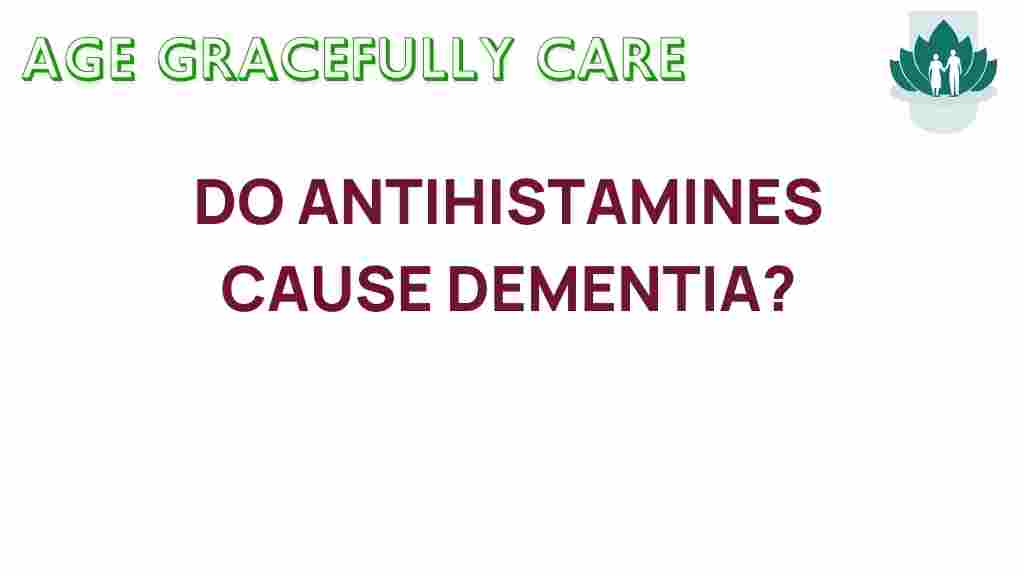Unraveling the Link: Do Antihistamines Increase Dementia Risk?
The relationship between medications and brain health has been a hot topic in recent research, particularly concerning antihistamines and their potential effects on dementia risk. As an essential component of elderly care, understanding the health risks associated with medications like antihistamines is crucial for preventing cognitive decline and memory loss. In this article, we will explore the findings related to antihistamines and dementia, delve into the mechanisms that may contribute to cognitive decline, and provide insights into how to manage medication effects effectively.
The Role of Antihistamines
Antihistamines are commonly used medications primarily prescribed to alleviate allergic reactions, hay fever, and other respiratory conditions. They work by blocking histamine, a substance in the body that causes allergic symptoms. However, they are also known for their sedative effects, especially the first-generation antihistamines. This sedative property raises concerns about their impact on cognitive health, particularly in the elderly.
Types of Antihistamines
There are two main types of antihistamines:
- First-Generation Antihistamines: These include diphenhydramine (Benadryl), chlorpheniramine, and brompheniramine. They can cross the blood-brain barrier and often cause sedation.
- Second-Generation Antihistamines: These include loratadine (Claritin) and cetirizine (Zyrtec). They are less likely to cause sedation and have a lower risk of affecting cognitive function.
Research Findings on Antihistamines and Dementia
Recent studies have raised concerns about the long-term use of first-generation antihistamines and their association with an increased risk of dementia. Some key research findings include:
1. Cognitive Decline and Anticholinergic Effects
First-generation antihistamines possess anticholinergic properties, which can lead to cognitive decline. Research has shown that long-term use of anticholinergic medications correlates with an increased risk of developing dementia. A study published in JAMA Internal Medicine found that older adults who regularly used anticholinergic drugs had a significantly higher risk of dementia compared to those who did not.
2. Mechanisms of Action
The proposed mechanisms behind the link between antihistamines and dementia include:
- Cholinergic Dysfunction: Since acetylcholine is essential for memory and learning, blocking its receptors can impair cognitive function.
- Neuroinflammation: Antihistamines may influence inflammatory processes in the brain, potentially contributing to neurodegenerative diseases.
3. Examining the Risks in Elderly Care
Elderly individuals often use antihistamines for allergies or sleep disturbances, leading to significant concerns regarding their brain health. According to a meta-analysis, the cumulative use of anticholinergic medications was associated with a 50% increased risk of dementia.
Medication Effects and Health Risks in Seniors
Understanding the broader effects of antihistamines on the elderly is crucial. The potential health risks include:
- Memory Loss: Users of first-generation antihistamines may experience short-term memory loss and long-term cognitive decline.
- Increased Fall Risk: Sedation can impair balance and coordination, leading to a higher risk of falls and associated injuries.
- Polypharmacy Issues: Older adults often take multiple medications, increasing the risk of drug interactions and compounded cognitive effects.
Managing Antihistamine Use: Step-by-Step Process
For caregivers and healthcare professionals, managing the use of antihistamines in older adults requires a systematic approach:
1. Evaluate the Need for Antihistamines
Assess whether the antihistamine is necessary for the patient’s condition. Consider non-pharmacological alternatives for allergy management or sleep issues.
2. Choose the Right Medication
If antihistamines are required, prefer second-generation antihistamines when possible, as they have a lower risk of cognitive decline.
3. Monitor for Side Effects
Regularly monitor the patient for any signs of cognitive decline or other side effects associated with antihistamine use. Documentation is essential for tracking changes in health status.
4. Educate Patients and Caregivers
Educate both patients and caregivers about the potential risks of antihistamines, including their effects on cognition and memory. Informed decisions can lead to better medication management.
Troubleshooting Tips for Caregivers
In light of the potential risks associated with antihistamines, caregivers may face challenges. Here are some troubleshooting tips:
1. Alternatives for Allergy Relief
Consider using saline nasal sprays, humidifiers, or air purifiers to reduce allergy symptoms without resorting to medication.
2. Sleep Hygiene Practices
Encourage good sleep hygiene practices like establishing a regular sleep schedule, creating a comfortable sleep environment, and reducing caffeine intake.
3. Regular Health Check-ups
Ensure that older adults have regular health check-ups to assess their overall health and medication regimen. This can help identify any emerging health risks early.
Conclusion: Prioritizing Brain Health in Medication Management
As we unravel the link between antihistamines and dementia risk, it is evident that careful consideration must be given to their use, especially in the elderly. The potential for cognitive decline and memory loss associated with first-generation antihistamines necessitates a proactive approach to medication management in elderly care. By evaluating the need for these medications, choosing safer alternatives, and monitoring their effects, we can better protect the brain health of older adults.
In summary, being aware of the health risks associated with antihistamines can empower caregivers and health professionals to make informed decisions that prioritize the cognitive well-being of those in their care. For more information on cognitive health and medication effects, visit Alzheimer’s Association.
This article is in the category Health and created by AgeGracefullyCare Team
